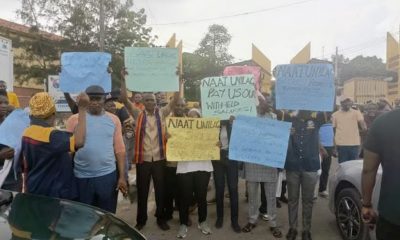A constitutional lawyer and elder statesman, Professor Ben Nwabueze (SAN), has faulted the Supreme Court ruling on Atiku Abubakar’s appeal against President Muhammadu Buhari’s 2019 presidential election victory.
Recall that a seven-man Supreme Court panel led by the Chief Justice of Nigeria (CJN), Justice Tanko Mohammad, had in about a four-hour ruling dismissed the appeal by Atiku, the candidate of the Peoples’ Democratic Party (PDP) and his party, challenging Buhari’s victory.
The CJN while delivering the judgment had said that the panel “examined all the briefs of argument and the exhibits for over two weeks and we have all agreed that there is no merit in this appeal”.
But in a statement in response to the ruling, Nwabueze said that the decision dismissing Atiku’s appeal as lacking merits was not taken at the sitting of the Supreme Court on October 30.
He went further to fault the manner by which the panel was appointed, saying that it was not in agreement with Section 36 of the 1999 Constitution, which provides for a fair hearing.
“Fair hearing requires among other things that it must be done in the presence of the parties.
“The ‘examination’ referred to in the CJN’s statement was certainly not done in the presence of the parties. The examination ‘of all the briefs of argument and the exhibits for over two weeks’ before 30th October, as announced by the CJN, could not be the fair hearing required by section 36 of the constitution.
“No ‘examination’ of all the briefs of argument and exhibits as announced by the CJN in the statement quoted above can constitute a fair hearing required by section 36 of the Constitution in the absence of the parties.
“Furthermore, not only is the hearing required to be conducted in the presence of the parties in order to be a fair hearing, section 36(3) requires it to be held in ‘public’. Section 36(3) is quite clear and unequivocal on this point.
“It says: ‘The proceedings of a court or the proceedings of any tribunal relating to the matters mentioned in subsection (1) of this section (including the announcement of the decisions of the court or tribunal) shall be held in public.’
“As the examination referred to in the statement by the CJN was not held in public, it is not the hearing required by section 36(3) of the Constitution. Secret hearings and trials are abhorrent to democracy.
“What happened in the Supreme Court on 30th October, 2019 is therefore a farce, not a valid hearing and determination of the appeal lodged by former Vice-President Atiku against the victory of President Buhari in the 2019 Presidential election as declared by INEC.
“Finally, the decision of the Supreme Court dismissing the appeal for lacking merits is a law within the meaning of Section 1 of the Constitution and, being inconsistent with section 36 of the Constitution, it is, by the self-executing declaration in section 1(3), null and void.
“Section 1(3) is a self-executing declaration and does not require anything else to bring it into effect. In other words, the decision dismissing the appeal is null and void without further ado.
“Whether or not the decision of the Supreme Court dismissing the appeal is a law within the meaning of section 1(3) of the Constitution, the Supreme Court is under and subject to Constitution as the ‘supreme law of the land binding on all authorities and persons throughout the Federal Republic of Nigeria’, including the Supreme Court,” Nwabueze said.

 Football5 days ago
Football5 days ago
 Aviation7 days ago
Aviation7 days ago
 Aviation6 days ago
Aviation6 days ago
 Featured3 days ago
Featured3 days ago
 Comments and Issues5 days ago
Comments and Issues5 days ago
 Education4 days ago
Education4 days ago
 Business4 days ago
Business4 days ago
 Featured1 week ago
Featured1 week ago













